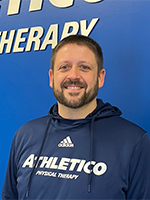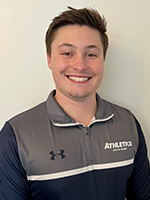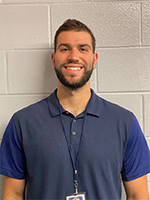2023 NATM AT Spotlight
 |
Ben Brown, AT, ATCOnsted High School, Onsted, MI Q: What’s something most people don’t know about athletic trainers? A: Athletic Trainers are among the few health professionals involved with every step of the Athletic injury journey. From the initial injury and diagnosis through rehabilitation and eventual return to play, Athletic trainers play a close role every step of the way. |
 |
Denise Alder MS, LAT, ATCNeuqua Valley High School, Naperville, IL Q: What is the most asked question you have received as an Athletic Trainer? A: I get asked how you became a practicing Athletic Trainer. Athletic Trainers are certified by the Board of Certification for the Athletic Trainer, BOC, and are licensed healthcare practitioners in 49 states. |
 |
Jessica Johnson, ATC, LAT, FMS, R/CEAS, RCIOnsite Innovations Client Company: Q: What’s something most people don’t know about athletic trainers? A: Athletic Trainers are the “MacGyvers of healthcare.” We are great at looking at our available tools and developing innovative solutions for various issues or injuries. Because of our broad education base, general scrappiness, and unique perspective (due to our daily interaction with our “patients”), we are perfectly placed to offer solutions that can be quite out of the realm of the status quo. |
 |
Joe Bedford, ATCClear Lake High School, Clear Lake, IA Q: What is the most asked question you have received as an Athletic Trainer? A: The most common question I’m asked is, what’s the worst injury I’ve ever seen? My answer would be a C3 fracture in a college football player during my first work week. It was a scary situation, but thankfully he fully recovered. |
 |
Josh Harris, MAT, LAT, ATCFort Zumwalt South High School, St. Peters, MO Q: What’s something most people don’t know about Athletic Trainers? A: Athletic Trainers are versatile healthcare professionals providing many different services for their patients in various settings. This includes, but is not limited to, patient education regarding injury and illness prevention, examination and assessment of injuries, rehabilitation of injuries, and immediate emergency care. There’s an AT for that, whether it’s on the field of play, a doctor’s office or hospital, or an occupational setting. |
 |
Lauren Gilliam, MS, AT, CEAS IIIOnsite Innovations Client Company: Q: What’s something most people don’t know about athletic trainers? A: An athletic trainer’s impact reaches far beyond athletics. As an industrial athletic trainer, I am in the unique position of directly improving the livelihood of team members onsite through ergonomic efforts while ensuring high-quality patient care remains a cornerstone of my clinical practice. I am passionate about garnering new field knowledge specific to my role and am grateful to be part of the industrial impact within this dynamic profession. |
 |
Marcus Patterson, BS, LAT, ATCHoward/Centennial High School, Ellicott City, MD Q: What’s something most people don’t know about Athletic Trainers? A: A lot of people aren’t aware of the scope of how involved the Athletic Trainer is in the care and prevention of injuries for the athletes they oversee. People often would say, “Oh, I thought you just gave out ice and water to people. You rehab their injuries as well?!” A lot of the preparation/prevention procedures that Athletic Trainers perform often go unnoticed (e.g., the creation of Emergency Action Plans, Preparation of Preseason Med-Kits for each athletic team, Monitoring of Wet Bulb Globe Temperatures on hot days, and adjusting practice times to prevent heat illness). That is why I often take the time to educate the athletes, coaches, and (if available) parents involved in my care about the various things I do so that we may shed light on all the necessary services Athletic Trainers provide. The more the community understands the role of the Athletic Trainer, the more appreciated our profession would become. |
 |
Matt Lamb, BS, ATCMountain Ridge High School, Frostburg, MD Q: What’s something most people don’t know about athletic trainers? A: One thing most people don’t realize about Athletic Trainers is that our athlete’s victories are our victories too. There’s no better feeling for an AT than having an athlete we’ve worked closely with get back in the game and absolutely crush it! |
 |
Michael Beckman, LAT, ATCWestosha Central High School, Salem, WI Q: What is the most asked question you receive as an Athletic Trainer? A: Working with high schoolers daily, I get asked, “Did you have to go to school to be an Athletic Trainer?” Yes, all Athletic Trainers have at least a bachelor’s degree. Today’s newer graduates will all have a master’s degree. We specialize in a broad scope of responsibilities to keep active individuals as active and healthy as possible, whether it’s through injury prevention, examination, immediate/emergency care, therapeutic intervention, and healthcare administration. |
 |
Nate Grimm, MS, LAT, ATCSeneca Valley High School, Maryland Q: What is something most people don’t know about athletic trainers? A: We are not only the first line for athletes who need immediate and emergency care, but we also perform heavily behind the scenes. As an athletic trainer, we also focus on rehabilitation. We can take an athlete from initial injury to injury clearance and return to play. We create our own differential diagnoses and rehabilitation plans. We serve a large part in the return to play process. |
 |
Saul Ramirez, ATCJoliet Catholic High School, Joliet, IL Q: What’s something most people don’t know about Athletic Trainers? A: What comes to mind in this question is the amount of education that an Athletic Trainer goes through. Even in the early years, ATs went through an accredited program or even an internship program. The medical knowledge an AT learns is far more than what people think. Now with the entry-level Master programs, it is a bit more. Then it doesn’t stop there. The number of CEUs an Athletic Trainer completed in a 2-year cycle is more than other professional groups. It’s a good thing because we must stay on our toes to provide the immediate care and rehabilitation required to athletes, industrial athletes, the military, and all we come in contact with. Q: What is the most asked question you receive as an Athletic Trainer? A: The most asked question after 30+ years of service is whether I like what I do. My response to this is, yes, absolutely! I shouldn’t be doing what I do if I didn’t like it. Not only would it affect me, but it can cause harm to someone else. |